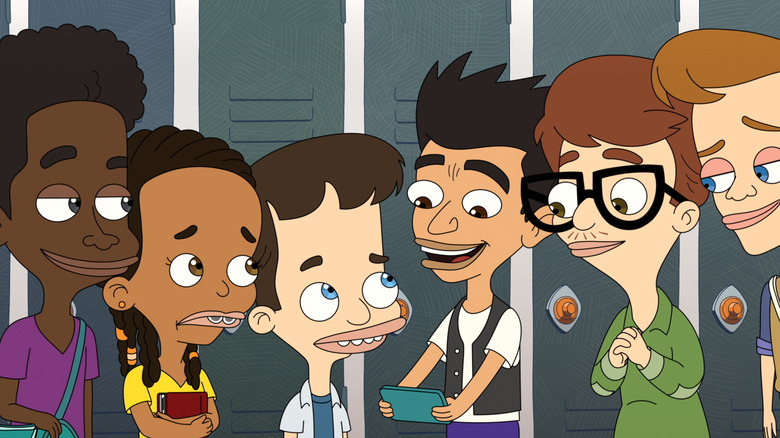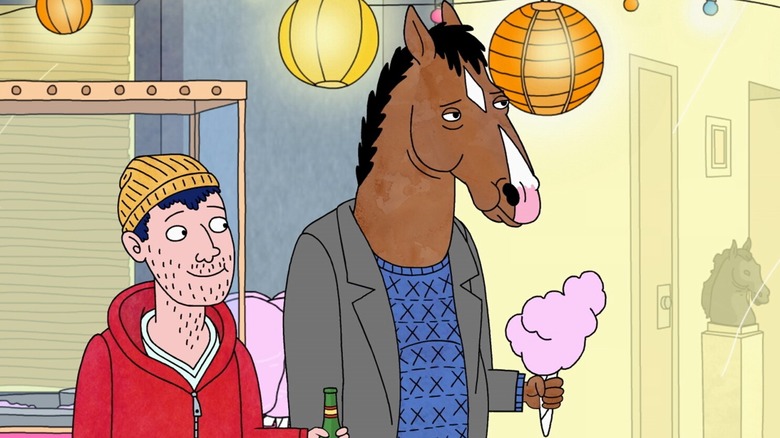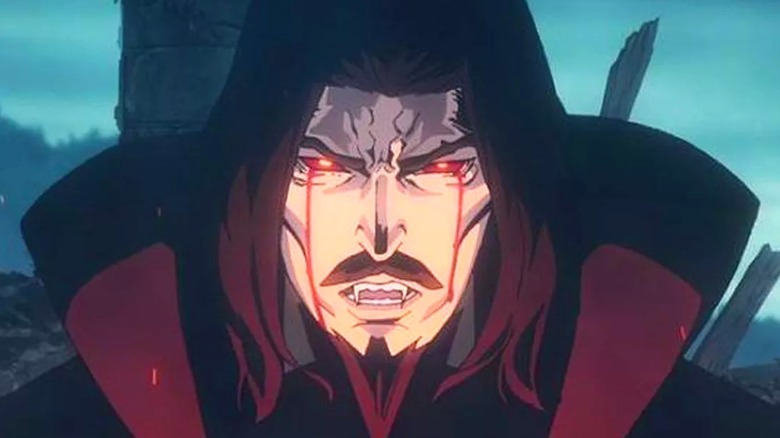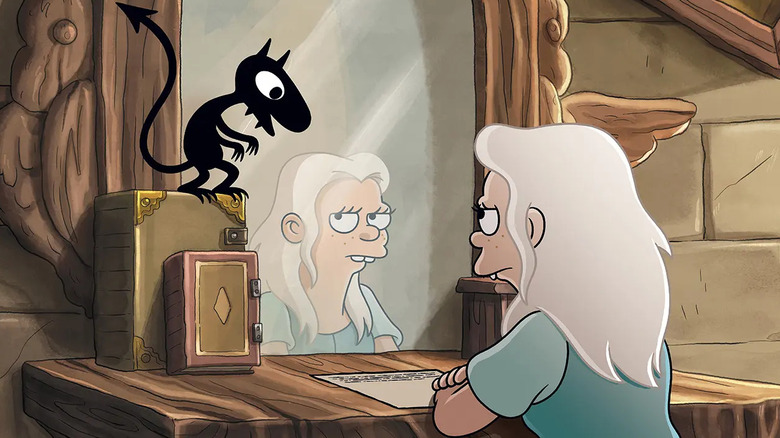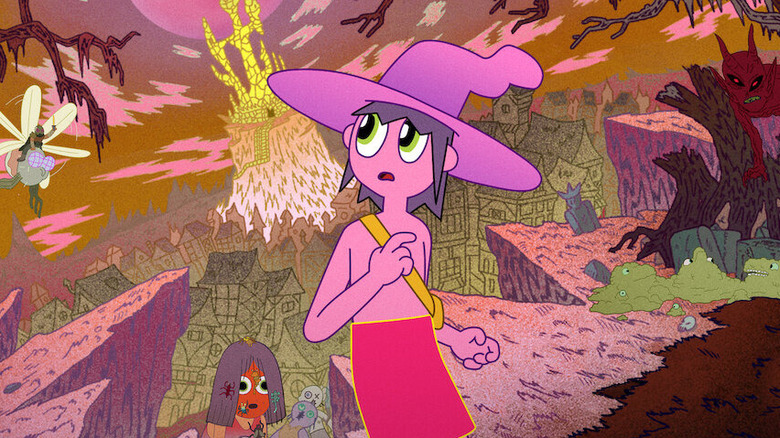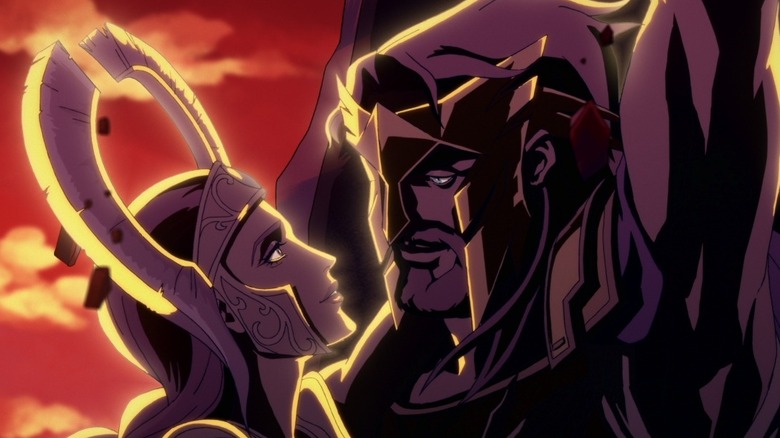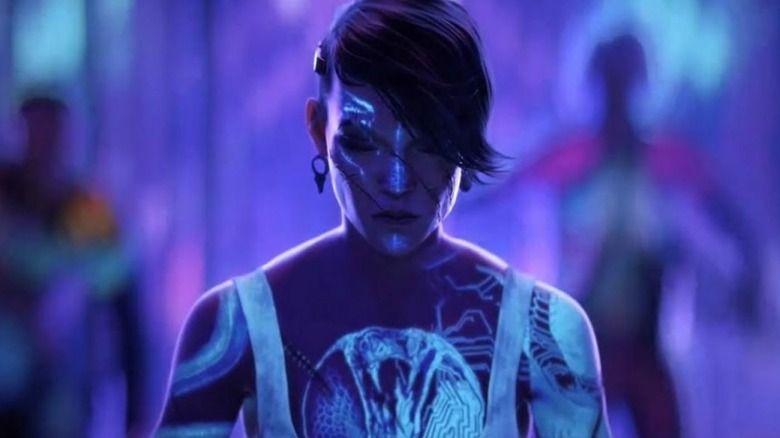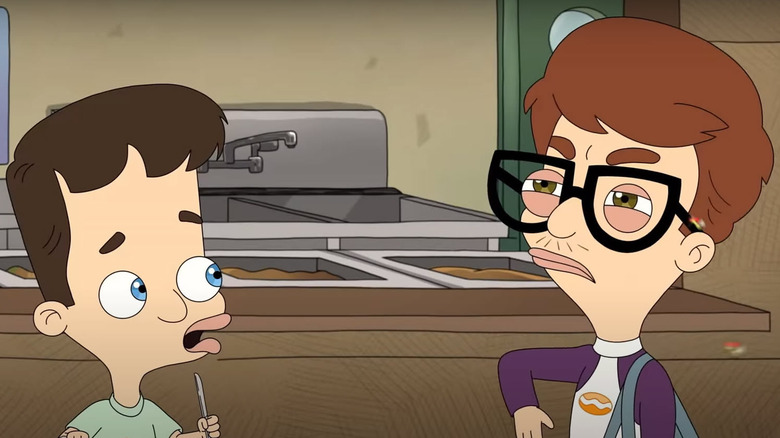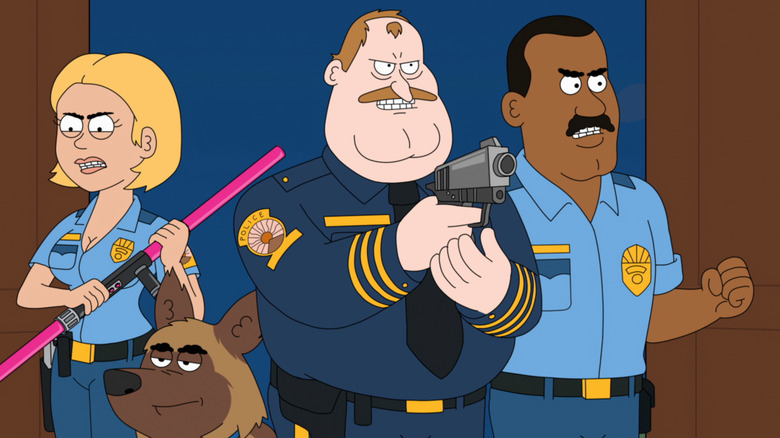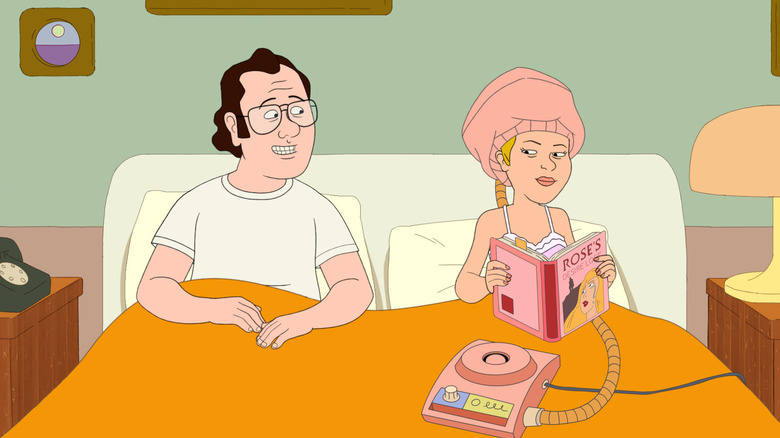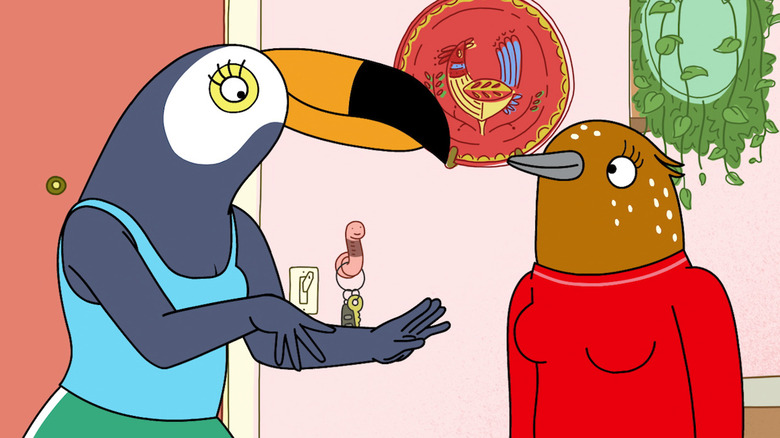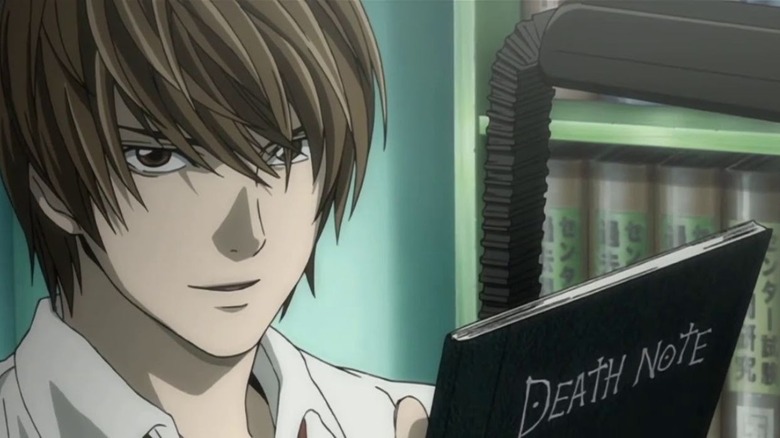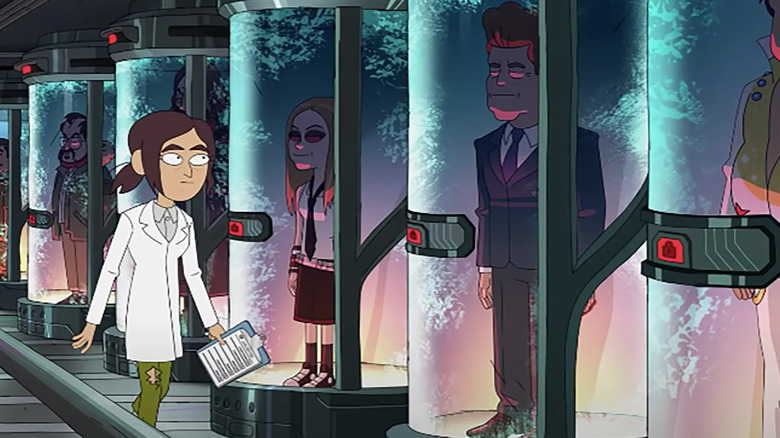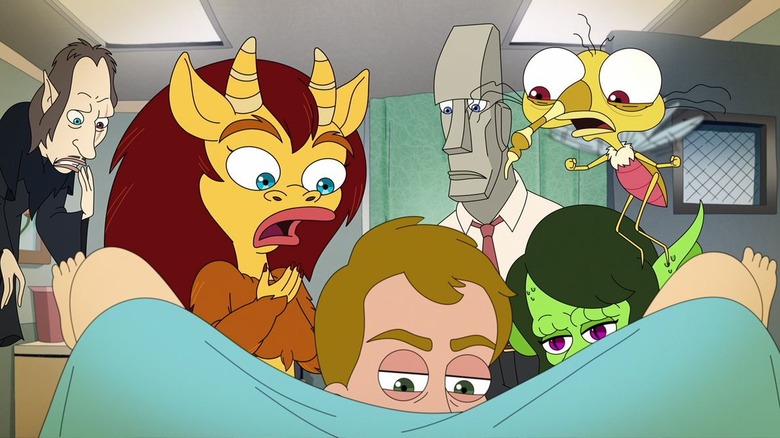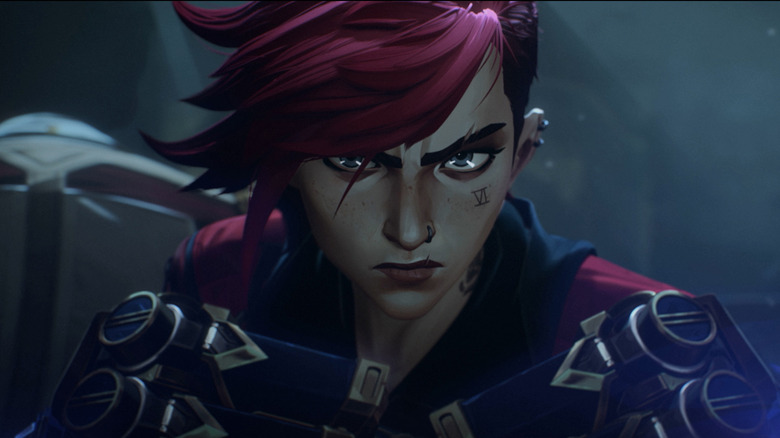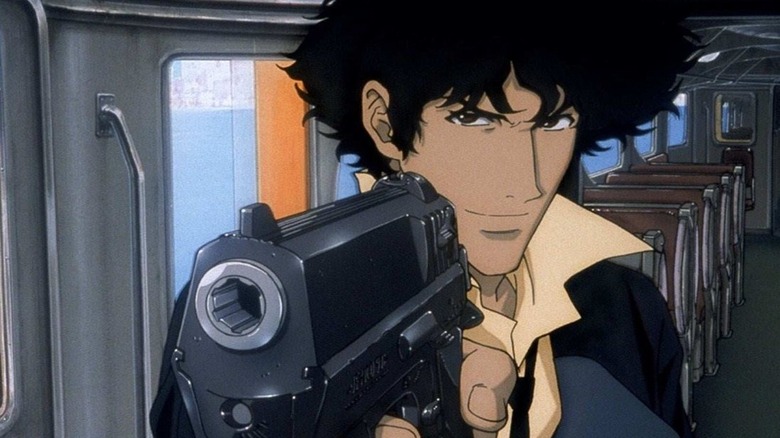The 15 Best Adult Animated Shows On Netflix
Even with the influx of all the new streaming services — a quick Google search says there are currently 24, which feels like it's about 20 too many — Netflix remains the most popular, and it's not all that close. But while many of us merrily binge Netflix's incredible original programming, its animated shows are often overlooked by adult viewers. That's a real shame, as these series are just as entertaining as their live-action counterparts. Sometimes, they're even superior.
Netflix has a deep collection of animated shows, too, with enough variety to satisfy even the most particular of viewers. These are not the Saturday morning cartoons you grew up watching, nor are they "adult" simply because they use colorful language. Rather, the shows' themes earn them that label. The series on this list touch on mature concepts like mortality, equality, addiction, sexuality, and grief, and explore what it means to be an adult — which, as it turns out, sometimes does involve a lot of cursing.
BoJack Horseman
No list like this would be complete without the king of adult animated series, long may it reign (or is it rein?). In "BoJack Horseman," Will Arnett stars as the eponymous character, a literal horse who behaves like any other person. In fact, that's a large part of what draws us to BoJack: He is shockingly human, often more so than many other characters, and probably some people that you know personally. BoJack is a depressed has-been floating through life, listless and unfulfilled. Who doesn't hasn't experienced that sense of quiet ennui?
"BoJack Horseman" is the rare critical darling that is also universally loved, and for good reason. While you'd be forgiven for calling it a comedy, the show is at its best when it's sad. "Free Churro," an episode from the show's fifth season, is one of the finest examples of what has been called the "sadcom," or shows that embrace a form of "cynical sincerity." The episode sees BoJack giving his mother's eulogy. It starts much as you'd expect — BoJack throws out jokes amid some general awkwardness — before meandering through random memories in which the only constant is the deceased's awfulness. The entire episode is one long monologue. BoJack is the only one who speaks, grieving out loud while leaving unsaid the question underpinning it all: Why didn't his mother love him? Episodes like "Free Churro" are why "BoJack Horseman" is so beloved.
Castlevania
A Gothic fantasy based on the video game series of the same name, "Castlevania" is one of the finest fantasy stories around, regardless of format. Gorgeous to look at and darkly funny, the show follows Trevor Belmont (Richard Armitage), the last surviving member of a famous monster-killing family. Trevor joins forces with Sypha Belnades (Alejandra Reynoso), a powerful wizard, and Alucard Tepes (James Callis), the half-man, half-vampire son of Vlad Dracula Tepes himself, to end the darkness plaguing their lands.
If only it were that simple. All Dracula stories are, at their heart, tragedies, and so is "Castlevania." Dracula (Graham McTavish) is clearly a monster, killing wantonly and without remorse. But this destruction comes in response to the death of his wife at the hands of religious zealots, so you kinda get where he's coming from. As Dracula mopes in his shadowy halls, you can't help but feel bad for him. When a story has you empathizing with the villain, you know it's a good one.
Disenchantment
This series from Matt Groening might bill itself as "Game of Thrones" by way of "The Simpsons," but the world of "Disenchantment" has far more in common with Springfield than Westeros. That's mostly a good thing, though in true "The Simpsons" fashion, the storytelling sometimes feels a bit inconsequential, especially in the first season; plot-wise, later seasons are much stronger and more cohesive. Despite the medieval digs, Groening's fans will feel right at home here, as the art style is comfortingly familiar and the sight gags and general zaniness you expect from his productions are present in the requisite amounts.
"Disenchantment" follows the exploits of Bean (Abbi Jacobson), a princess with a rebellious streak, a silly fish-out-of-water elf named Elfo (the always quirky Nat Faxon), and Luci (Eric Andre), Bean's personal house demon who resembles the Marvel Cinematic Universe's Loki in temperament and who may or may not be a cat. There are currently four seasons, and each one is better than the last, as the show quickly outpaced its initial premise.
Midnight Gospel
"Midnight Gospel" is a surreal series from "Adventure Time" creator Pendleton Ward and comedian Duncan Trussell that pairs recordings from Trussell's podcast, "The Duncan Trussell Family Hour," with psychedelic animation. The topics are deep and wide-ranging — the show broaches mortality, drug use, and existential dread, among other things — but the on-screen action has no bearing on the discussion. It's literally just there to give you something to look at. However, if you can get past the series' conversational nature, you'll find yourself swept away by its stories.
There are only eight episodes of "Midnight Gospel," each one clocking in at about 20 minutes. It's easily worth a binge, but the episodes stand alone and can be watched independently if you want to pick out the topics that interest you. Standout installments include "Annihilation of Joy," in which the nature of reality is examined in a bizarre "Groundhog Day"-like prison, and "Mouse of Silver," where the host talks to his mother about life, death, loss, grief. It's one of the most moving interviews you'll ever hear.
Blood of Zeus
A fantasy epic that uses Greek mythology as a jumping-off point, this action-adventure series tells a beautifully bloody tale about the wars between gods, giants, and demons, as well as the squishy humans caught in the middle. Heron (Derek Phillips) is a nobody who slaves away in a mine until events bring demons to his door. In short order, Heron is revealed to be the son of Zeus, and a demigod due to his mixed god and human blood. It's a path we've tread many times before — a hero's journey initiated via a one-night stand is boilerplate Greek mythology — but, fortunately, "Blood of Zeus" has a few surprises in store.
The show is very similar to "Castlevania" in the style of its animation (the two shows share a studio), its love of gore, and its somber tone, though it doesn't have the Gothic horror's wonderful sense of humor. This is Greek storytelling writ large, and while I can't vouch for its faithfulness to the mythology, nothing feels egregiously out of place. Mostly, I was just riveted by the action and excited to see what came next. Good news on that front: Netflix has already confirmed that a second season is in the works.
Love, Death & Robots
This anthology series, which was created by "Deadpool" director Tim Miller, provides some of the very best stories on Netflix, period. Each episode is a standalone short, with most between 10 to 15 minutes long. The shorts range the gamut of speculative fiction — action-adventure, horror, satire, science fiction, and fantasy — and are often a blend of several genres. Most of them are also adapted from stories by well-known authors, including the likes of John Scalzi, Alastair Reynolds, Peter F. Hamilton, and Harlan Ellison.
By their very nature, anthologies are notoriously uneven, and a few episodes of "Love, Death & Robots" are a little lackluster. "When the Yogurt Took Over" is too wacky, and "Swarm" employs the sort of ho-hum storytelling the series usually avoids. But the missteps are few and far between. "The Drowned Giant" is an affecting meditation on mortality. "Beyond the Aquila Rift" is akin to the slowly-dawning horror of "Event Horizon." Even "Three Robots," which attempts nothing more strenuous than making you laugh, shines due to the strength of its witty writing.
Big Mouth
Puberty is many things: confusing, awkward, strange, exciting, and terrifying. If it is funny at all, it's only in retrospect, once we are safely insulated from the horrors by time and experience. If you laughed at all when your body first started secreting alien fluids, it was probably only reflexive. "Big Mouth" explores this chaotic time in our lives, but it manages to be hilarious; maybe puberty is only funny when it happens to someone else?
A show that only pokes fun at the physical changes that teenagers endure would quickly wear out its welcome. Fortunately, "Big Mouth" has more on its mind than the wonderful strangeness of the human body. Simultaneously poignant and repugnant, "Big Mouth" has faint echoes of "Beavis and Butt-Head," but doesn't have that earlier series' casual misogyny. Instead, there's an innocence to "Big Mouth" that reminds you what life was like before sex started making everything weird. "Big Mouth" is forward-thinking and sex-positive, with characters like the hormone monsters, who encourage the characters' more base urges, and are used to explain things like inconveniently timed erections and violent shifts in mood. It's a series that bursts with creativity — the Shame Wizard is one of the greatest concepts ever — and should not be missed.
Paradise PD
A crassly funny satire about the most incompetent police force you've ever seen, "Paradise PD" fully leans into the absurd. To wit: The show's cast includes Police Chief Randall Crawford, who has accidentally had his testicles shot off — twice! — by his young son while he was in bed with his wife; Officer Dusty Marlowe, a man so obese that he's bulletproof; Officer Gina Jabowski, a borderline psychotic who openly lusts after Officer Marlowe; and Bullet, a police dog who can't stop abusing the drugs he's supposed to be guarding.
Newly hired Officer Kevin Crawford is the straight man, added to the force some 10 years after he inadvertently neutered his father. He's initially considered incompetent for obvious reasons, but gradually earns the respect of the other officers, including his dad. That's the overarching story, but these types of shows don't generally bother with continuity, and we don't really expect it here. We're here for the absurdity and the laughs. "Paradise PD" is "Family Guy" with guns and cussing and a lot more jokes about genitalia.
F is for Family
F may be for "family," but it's also shorthand for ... something else. Case in point: Comedian Bill Burr created this series, and it's as foul-mouthed as you'd expect. Burr stars as Frank Murphy, the patriarch of an American family in 1970s middle America. Frank is crude and ill-tempered, the kind of guy who perpetually seems one psychotic break from a "Falling Down" sort of day. But for all that, Frank is a family man, and the show's heart-warming moments are as surprising as they are quietly moving.
The show's characters are voiced by one of the most star-studded groups you will find in an animated series: Laura Dern, Justin Long, Sam Rockwell, Vince Vaughn, Allison Janney, and T.J. Miller. But as great as the "F is for Family" cast is, equal billing must be given to the setting itself. The show is a love letter to an America that may have only truly existed in our time-faded memories — or those of our parents — but for those of us who are old enough, it is touching and bittersweet nostalgia.
Tuca & Bertie
"Tuca & Bertie" is a female-centric buddy comedy in which two bird-women navigate their 30s, and all the anxiety that entails. Tuca (Tiffany Haddish) is a horny and impulsive toucan, and Bertie (Ali Wong) is an anxious, career-minded song thrush. Together, they're an avian odd couple, but for all their differences their friendship remains a beautiful constant. It's the same energy as the Gilmore girls gabbing over coffee at Luke's: feminist, wholesome, and empowering.
"Tuca & Bertie" is energetic and full of sight gags, but it also doesn't shy away from meatier themes, like gender equality. Comparisons to "Bojack Horseman" are inevitable — not only are there lots of anthropomorphic creatures running around, but series creator Lisa Hanawalt was the designer on "Bojack," so the two shows have a similar look — but "Tuca & Bertie" the is fun, airy yang to the earlier series' cynical, self-absorbed yin. Plus, you know, the bird show includes a left breast voiced by Awkwafina. Unfortunately, Netflix canceled the series after one season, but Adult Swim picked it up and has released two more.
Death Note
An intelligent but discontent high school student named Light Yagami — yes, his name ends up being highly ironic — stumbles across a supernatural book called the Death Note. Anyone whose name is written in the book dies immediately (there are some rules, but that's the gist). It was left in our world by a death god named Ryuk who thought it'd be an interesting prank; given the first episode ends with Light declaring himself a god after murdering untold numbers of people, he's not wrong.
That's an interesting place to start a series, and although Light is never all that sympathetic, he remains the protagonist of "Death Note" despite his increasingly unheroic actions. Even Light's initial plan to rid the world of evil sends him tumbling down a slippery slope, as to do so he must become evil himself. It's a dichotomy that Ryuk mentions, but his observations fall on deaf ears — Light has already been consumed by his quest. Alarmed by all the deaths, the International Police assign a mysterious but brilliant detective known only as "L" to the case. What follows is a taut dance, as the hunter repeatedly becomes the hunted and vice versa over the next 10 years. "Death Note" is a tightly-plotted thriller that's as horrifying and addictive as "Stranger Things" and other shows of its ilk.
Inside Job
"Inside Job" is based on a simple premise: Every conspiracy theory you've ever heard is (probably) true. Reagan Ridley (Lizzy Caplan) is a brilliant but frazzled engineer who works for a shadowy government agency with a real Area 51-type vibe, and who thinks there is no problem that can't be solved with the right kind of tech. The "tech genius as social misfit" trope is played out, but Reagan is, thankfully, more than the sum of her parts, and the show's writers add a touch of humanity to her mostly-inhuman instincts.
Reagan's co-workers include Brett Hand (Clark Duke), a yes-man so nondescript he is impervious to facial recognition software; Glenn Dolphman (John DiMaggio), a weird blend of man and dolphin who is also a raving patriot; and Magic Myc (Brett Gelman), a psychic, mushroom-like jellyfish creature with eight tentacles that double as penises. Christian Slater plays Reagan's father, Randall Ridley, who once tried to blow up the sun to solve skin cancer.
In case you haven't figured it out, "Inside Job" is not a serious show. However, amid all the clones, malevolent AIs, and cloaked overlords, it finds time to quietly comment on the real world, including how media shapes our perceptions (and thus, our reality), workplace politics, and gender equality.
Human Resources
This series calls itself "Big Mouth" meets "The Office," though it also contains generous portions of "Monsters Inc.," "Inside Out," and "Superbad." That's a strange-sounding stew, but the result is refreshingly original. "Human Resources" is a "Big Mouth" spinoff that lets us spend more time with the mothership series' recurring background characters, including the hormone monsters and my favorite, the Shame Wizard. The show is tonally similar to "Big Mouth," but with everything dialed up to 11.
"Human Resources" is about monsters who work for a corporation called, well, Human Resources, which is tasked with helping humans manage their emotions. Imagine "Inside Out," only the monsters are nymphomaniacs, and you won't be far off the mark. The monsters can be seen by their human clients, which invites some entertaining quasi-fourth-wall breaking. Despite the out-there subject matter — or perhaps because of it — "Human Resources" has attracted a number of high-profile guest stars, including Hugh Jackman, Helen Mirren, Lupita Nyong'o, Rosie Perez, and Bobby Cannavale, just to name a few.
Arcane
"Arcane" is an absolutely gorgeous series set in the same universe as the "League of Legends" video game, although you need no familiarity with the game to enjoy the show. Grim and gritty, this steampunk fantasy is reminiscent of Leigh Bardugo's novels in temperament and touches on the same themes, though with its own twist. "Arcane" looks like something you'd see on the big screen; the animation is beautifully done, the music and voice acting are stellar, and the direction plays up the emotions at every turn.
The show is a prequel of sorts, and serves as the origin story for some of the game's characters. On the whole, it all feels very Dickensian. The story focuses on the haves and the have-nots of Piltover and Zaun, making it a sort of "A Tale of Two Cities" with magic. These themes are primarily explored through orphaned sisters Violet (Hailee Steinfeld) and Powder (Ella Purnell), who end up on opposite sides of an ideological divide about how those in the undercity should respond to their oppressors. For fantasy fans, "Arcane" is a must-watch.
Cowboy Bebop
Whether you loved or hated the live-action remake, there is no denying that the animated version of "Cowboy Bebop" is far superior. Widely considered one of the greatest anime series of all time, "Cowboy Bebop" has been an anime gateway drug for Western audiences for 25 years, and it has influenced the work of directors like Quentin Tarantino and Rian Johnson. In a very "Star Wars" sort of way, "Cowboy Bebop" is a melting pot of different influences, most notably noir pulp and space westerns, but also kung fu flicks, dystopian cyberpunk stories, and sci-fi horror. The joining of such disparate threads weaves a wholly original world that is simply mesmerizing.
The story follows a crew of registered bounty hunters aboard the spaceship Bebop, a less-decrepit Millennium Falcon. In this world, bounty hunters are called "Cowboys," and our main crew is less of a found family, and more just a group of plain old mercenaries. Episodes often involve the crew pursuing a new target, though there is an overarching story that I won't spoil. Like Han Solo in the original "Star Wars," these Cowboys are in it for the money, and they shoot first. It's one of the greatest TV shows ever made.
